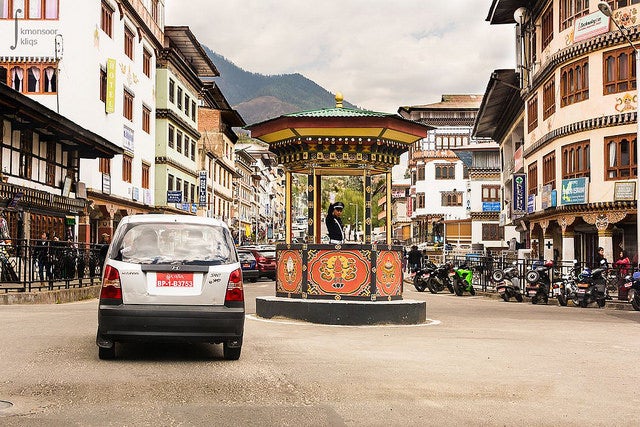
In Bhutan, the only country that measures success on a scale of Gross National Happiness (GNH), government officials actively research ways to make residents’ lives happier. So when it became apparent that the growing number of vehicles in Thimphu, the capital city, was increasing traffic congestion and causing intense frustration among locals, the authorities started looking for a solution to restore contentment among its citizens.
First, government leaders noticed that people who shopped in central pedestrian areas in large cities around the world had a better shopping experience. So they thought about ways to create a pedestrian shopping zone in Thimphu—a daunting challenge. They began with temporary measures such as “pedestrian Sundays” once a month while researching a permanent solution to get rid of the cars in the City Centre. The main problem was the city’s lack of an alternative to the on-street parking, which was contributing to congestion. Pondering this problem ultimately led to the idea for Bhutan’s first successful transportation public-private partnership (PPP), a parking infrastructure and management project.
Happiness through better parking
The importance of Thimphu, the capital city of Bhutan and its economic center, is hard to overstate. Thimphu alone accounts for 45 percent of the country’s GDP. In parallel with an economic boom, the city urbanized at a fast rate of 6 percent annually between 2005 and 2012—resulting in skyrocketing car ownership and often unreliable public transportation. In a country where there is not even one traffic light, it is not unusual to see luxury SUVs lumbering along narrow roads. The resulting reality—transportation bottlenecks—demanded a constructive solution.
Our Delhi-based team at the International Finance Corporation (IFC) had already been working in Bhutan for a few years on other transportation solutions, and so the government brought us in to help advise on a PPP to design, build, and operate an effective, efficient parking infrastructure and management system for Thimphu.
It was as close to a textbook PPP as possible: IFC prepared a well-balanced risk allocation based on Thimphu’s needs, alongside feedback from potential investors and financiers. We worked on developing a simple concession model that would create value-for-money for Thimphu, in a country where understanding of PPPs was still embryonic.
According to the final terms of the PPP contract, the concessionaire will be responsible for the parking garage and all other publicly-owned off-street and on-street parking facilities within the core city area. Apart from three existing privately owned and operated paying parking facilities, the concessionaire will be given exclusivity to provide parking services and collect parking fees in the core city area.
Collaboration was key to this PPP
Throughout our efforts in Bhutan, the straightforward nature of the project, and the cooperative working relationship among IFC, government officials, and the private operators and financiers, allowed for steady progress. Many long meetings held over successive cups of butter tea, a national specialty, guided our collaborative efforts and brought the project to the bidding phase in a timely way.
However, just because it was a straightforward transaction doesn’t mean that it was typical. Bhutan’s commitment to designing the parking structure in a way that would match the architecture of the capital’s other buildings meant that no concrete block would blight shoppers’ view. Instead, promises to reflect authentic historical designs were included in the permitting process, and architects matched the arcs and spires that the city is known for. If happiness is even partly grounded in aesthetics, the beauty and originality of this parking garage – and the solidity of the PPP that created it—ratchets up the GNH meter considerably.
Related:
Public-Private Partnership Stories | Bhutan: Thimphu Parking
We are recruiting! Interested in what we do? Apply for a chance to join our communications and outreach team here.


Join the Conversation